BBC Homepage
●Skip to content
●Accessibility Help
●Your account
●Home
●News
●Sport
●Earth
●Reel
●Worklife
●Travel
●
Search BBC
●
●
●
●
●
●
●
●
●
●
●
●
●
Close menu
BBC News
Menu
●Home
●Israel-Gaza war
●War in Ukraine
●India Election 2024
●Climate
●Video
●World
●Asia
●UK
●Business
More
●Tech
●Science
●Entertainment & Arts
●Health
●World News TV
●In Pictures
●BBC Verify
●Newsbeat
●Tech
US government lifts lid on alleged leak to WikiLeaks
Published
Share page
About sharing
By Chris Vallance
BBC News
The US state department has told the BBC it believes an alleged whistle-blower obtained secret diplomatic data despite being at a field base in Iraq.
Serviceman Bradley Manning, 22, faces two charges related to the illegal transfer and transmission of classified information from a US military network.
The US said he was suspected of downloading from SIPR Net.
He reportedly then passed on the data, including army videos and diplomatic messages, to the WikiLeaks website.
WikiLeaks has repeatedly said it does not have the confidential messages and the site itself is not mentioned in the charges against Private First Class (Pfc) Manning.
A former hacker, Adrian Lamo, reported Pfc Manning to the US authorities. He said the intelligence analyst admitted, in a series of online chats, to sending data to the whistle-blowing website.
In the redacted charge sheet detailing the accusations against Pfc Manning, the Army alleges that he transmitted, "to a person not authorised to receive it", a classified US Department of State cable described as "Reykjavik 13".
The US also alleges Pfc Manning obtained 150,000 US diplomatic cables without proper authorisation.
Previous incidents
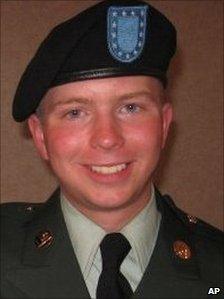 Image caption,
Image caption,
US Private Bradley Manning has been charged with leaking the Iraq video
In February this year, WikiLeaks released a diplomatic cable from 13 January 2010 recording details of a meeting in Iceland between US diplomat Sam Watson, British ambassador Ian Whitting, and members of the Icelandic government.
Now the state department has told BBC News how Bradley Manning, based at the Hammer military field base in Iraq, could have accessed information unrelated to the US mission in that country.
In an e-mail, US state department spokesperson Megan Mattson said: "After the events of 11 September 2001, agencies across the federal government understood that greater information sharing was vital to protecting our national security interests.
"As part of our efforts to make Department of State information available to those who have a legitimate need to know, we established the Net Centric Diplomacy initiative, which allows Department of State information to be shared on the Department of Defence's SIPR (Secret Internet Protocol System) Net system."
Ms Mattson said that access to the system was only permitted to those "civilian and military users with appropriate security clearances".
She said that Bradley Manning was "suspected of violating the trust and confidence given to him".
Pooled resources
Catherine Lotrionte, associate director of the Institute for Law, Science and Global Security, has a background in US intelligence work
She told BBC News that there was "a push after 9/11 that information was going to be shared - and databases connected."
In her view, data-sharing is necessary for effective intelligence work, and the risk that it may make large data breaches easier is simply "the cost of doing business - the downside is that someone may break the rules".
Speaking on condition of anonymity, a retired US General, with extensive military intelligence experience, told BBC News that there were, "layers of clearances designed to protect and restrict access to data."
He said that sharing information was the right thing to do and the military benefits far outweighed the risks.
But Crispin Black, a former intelligence analyst for the UK government, says the content of cables can be very sensitive.
"Diplomatic cables don't usually contain huge secrets but they do contain the unvarnished truth so in a sense they can be even more embarrassing than secrets."
He told the BBC that the possibility that someone in a base in Iraq could potentially access cables about Iceland violated, the principle of "need to know" in intelligence.
According to claims by Adrian Lamo, Pfc Manning told him in online chats that he removed information by burning it onto a CD.
Mr Lamo claims that Pfc Manning told him that he disguised his activities by pretending he was listening to music by Lady Gaga.
According to Lamo, Pfc Manning is alleged to have said in one online-chat that "Hilary Clinton, and several thousand diplomats around the world are going to have a heart attack…"
Top secret
WikiLeaks has consistently denied possessing the thousands of diplomatic cables Mr Lamo alleges were passed to them.
WikiLeaks editor Julian Assange told BBC News on Thursday that he was "disturbed" by the charges against Bradley Manning.
Mr Assange said that it was "clear that some of those charges relate to information that should not have been classified".
While WikiLeaks says that it is technically impossible for it to know if Pfc Manning is indeed its source, it is trying to assist in his defence.
Mr Assange said that contact had not been established with Pfc Manning personally but that he expected that would change shortly.
He said that whoever had leaked the information was a "hero" for exposing wrong-doing by the US military and accused the army of a "double standard" in prosecuting Pfc Manning.
More on this story
US soldier on Iraq leaks charges
Published
6 July 2010
WikiLeaks makes contact with US
Published
22 June 2010
WikiLeaks site unfazed by arrest
Published
8 June 2010
Related Internet Links
WikiLeaks
Wired News
The BBC is not responsible for the content of external sites.
Top Stories
Stuck in hospital for months - but not ill
Published
2 hours ago
BBC Verify analyses Manchester Airport incident footage
Published
1 hour ago
Watch: How drones and the battle for Ukraine are changing the future of warfare
Published
9 hours ago
Features
The Papers: Potential 'autumn tax raid' after '£20bn hole in public finances'

‘I’m stuck in a prison’: Disabled and trapped in hospital for 10 months
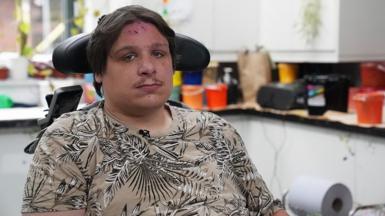
BBC Verify analyses Manchester Airport incident footage

Weekly quiz: How did Charli XCX's Brat-girl summer get a boost?

Venezuela election: Five things you need to know
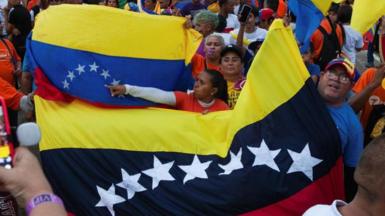
What's behind the global self-storage boom?

Trump shooting: The plan and the botched response

Griff has toured with Taylor Swift, but still gets stage fright

Satellite images and doctor testimony reveal new hunger crisis in Ethiopia

Elsewhere on the BBC
'It was insane to be there and feel the energy'
Dame Jessica Ennis-Hill shares the most memorable moments from her career

How will Russell cope as a conflict-averse manager?
Slide into a brand-new comedy series from the makers of People Just Do Nothing

A tragic case of mistaken identity that shook Britain
In 1969, kidnappers targeting Rupert Murdoch's wife abducted Muriel McKay by mistake
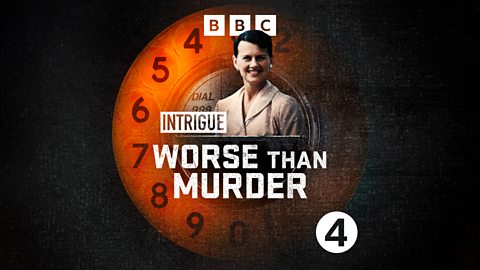
'We drive into the unknown with bombs falling'
Extraordinary first-person footage of a group of volunteers saving civilians’ lives in Ukraine
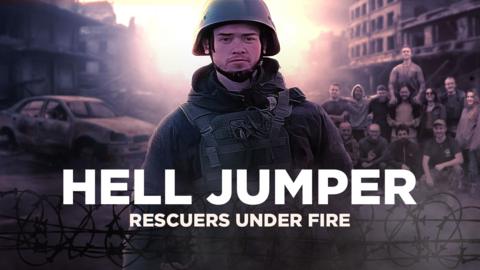
Most Read
1
Potential 'autumn tax raid' after '£20bn hole in public finances'
2
Leader of Mexico's Sinaloa drug cartel arrested in Texas
3
Stuck in hospital for months - but not ill
4
'Missed chances' over death of mum found under coat in A&E
5
Stride announces Conservative leadership bid
6
Dujardin condemned by GB team-mate Hester
7
Sainsbury's sorry for 'racist slur' trouser detail
8
Former STV host jailed for stealing £120,000 from her mother
9
North Korea hackers trying to steal nuclear secrets, US and UK warn
10
Jury discharged in 'Good Samaritan' murder trial
BBC News Services
●On your mobile
●On smart speakers
●Get news alerts
●Contact BBC News
●Home
●News
●Sport
●Earth
●Reel
●Worklife
●Travel
●Culture
●Future
●Music
●TV
●Weather
●Sounds
●Terms of Use
●About the BBC
●Privacy Policy
●Cookies
●Accessibility Help
●Parental Guidance
●Contact the BBC
●Get Personalised Newsletters
●Why you can trust the BBC
●Advertise with us
© 2024 BBC. The BBC is not responsible for the content of external sites. Read about our approach to external linking.



 ‘I’m stuck in a prison’: Disabled and trapped in hospital for 10 months
‘I’m stuck in a prison’: Disabled and trapped in hospital for 10 months
 BBC Verify analyses Manchester Airport incident footage
BBC Verify analyses Manchester Airport incident footage
 Weekly quiz: How did Charli XCX's Brat-girl summer get a boost?
Weekly quiz: How did Charli XCX's Brat-girl summer get a boost?
 Venezuela election: Five things you need to know
Venezuela election: Five things you need to know
 What's behind the global self-storage boom?
What's behind the global self-storage boom?
 Trump shooting: The plan and the botched response
Trump shooting: The plan and the botched response
 Griff has toured with Taylor Swift, but still gets stage fright
Griff has toured with Taylor Swift, but still gets stage fright
 Satellite images and doctor testimony reveal new hunger crisis in Ethiopia
Satellite images and doctor testimony reveal new hunger crisis in Ethiopia

 How will Russell cope as a conflict-averse manager?
Slide into a brand-new comedy series from the makers of People Just Do Nothing
How will Russell cope as a conflict-averse manager?
Slide into a brand-new comedy series from the makers of People Just Do Nothing
 A tragic case of mistaken identity that shook Britain
In 1969, kidnappers targeting Rupert Murdoch's wife abducted Muriel McKay by mistake
A tragic case of mistaken identity that shook Britain
In 1969, kidnappers targeting Rupert Murdoch's wife abducted Muriel McKay by mistake
 'We drive into the unknown with bombs falling'
Extraordinary first-person footage of a group of volunteers saving civilians’ lives in Ukraine
'We drive into the unknown with bombs falling'
Extraordinary first-person footage of a group of volunteers saving civilians’ lives in Ukraine
